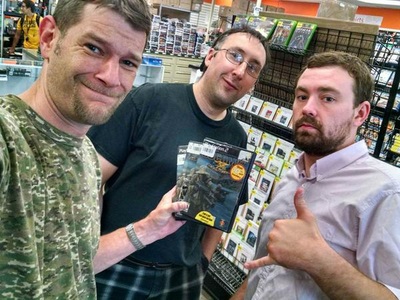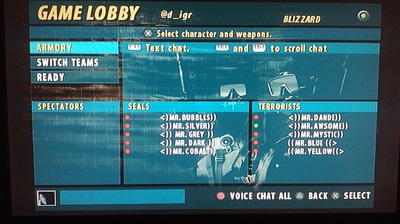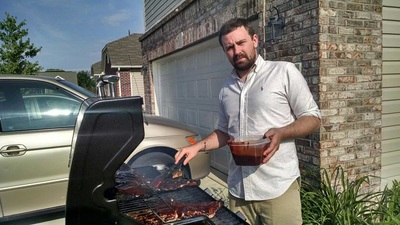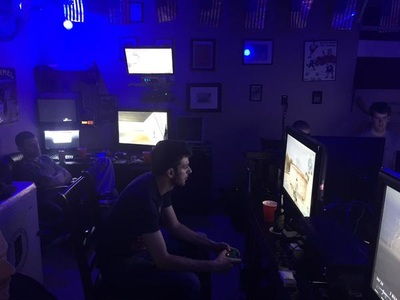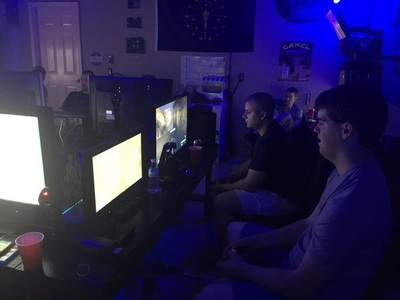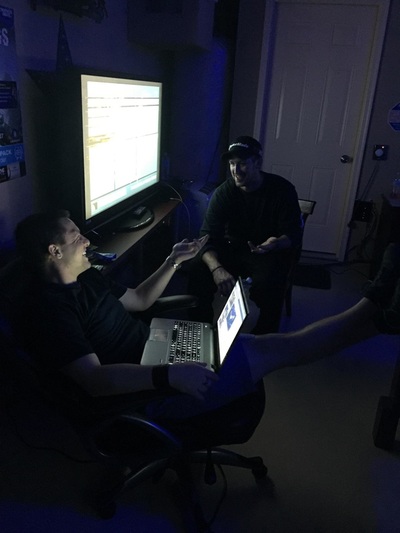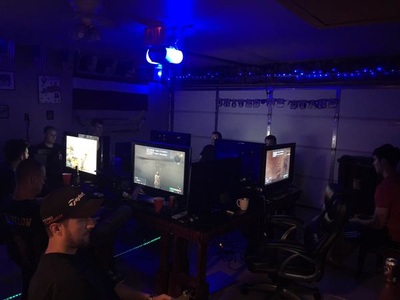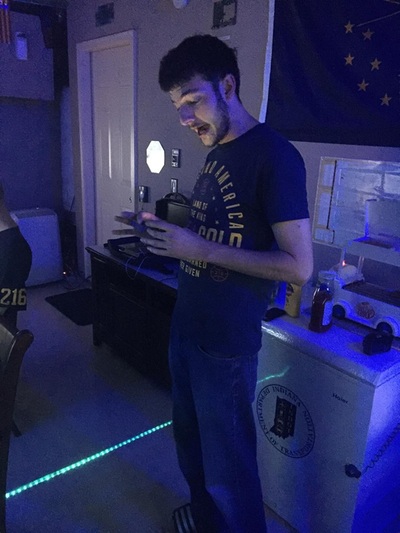|
Following extension after extension, the Rainbow Six Siege Beta finally came to an end. Over the 14 days I spent immersed in multiplayer gameplay with clanmates and old tactical shooter friends, I felt a mixture of emotions, met a bunch of new players, and was reminded of what team-based shooter gaming is all about. The following are my thoughts after playing the Rainbow Six Siege closed/open beta. CON: My only real gripe during the Beta was its matchmaking freezes and disconnects. Though this was incredibly frustrating, it's to be expected during Beta phase. I'm confident this will be a non factor come full release on Dec. 1st. The issues that were brought up concerning the cameras were quickly quelled by learning where they were and dispatching of the tattle tale lenses. This aside, let's move to the pros. My first observations was that there were a lot of people from my friends list, which is pretty diverse, that played and enjoyed the R6 Beta. These are people that I've met across many games, some tactical, some not. I found this united interest empowering. I watched my diverse network of friends quickly shine in the tactical teamwork and coordination spotlight of Siege. In contrast, we've played many other tactical games since SOCOM and none have created the level of "activation" I witnessed during the Siege Beta. It was pretty awesome to watch the R6 Beta community come alive through the game's tactical teamwork requirements. My second observation was the general conversation and camaraderie that took place among players and in between gameplay sessions. This reminded me a lot of SOCOM's "dead room," where players waiting to re-engage in gameplay actually took time to learn about their fellow gamers. It gave me hope that amid the overwhelmingly self-centered cultures found in many shooter gaming communities, there are still those with prosocial and proactive tendencies. My third observation was actual gameplay. Overall, I found the quality of play exceptional. The Dev. team's focus on strategy, planning, and coordination was refreshing. There was relatively no lag, great hit detection, intuitive controls, and fluid communication systems. The unlocking system was easy to understand and provided varied gameplay based on your personal preference. I also found the dedicated operator roles increased the Beta's tactical depth and replay value. When the game functioned as it was supposed to, R6 gameplay held our attention very well. The general consensus of my clanmates, friends, and the gamers we met during the R6 Beta is that most will be purchasing and playing this game to once again compete within a true tactical shooter universe. Considering the current trajectory of this IP, I envision Rainbow Six Siege becoming a rather popular haven for the tactical minded. I also see the R6 universe becoming a durable home for our 12-year tactical shooter gaming community for years to come. I can't wait wait for December 1st. LT Mystic out! R6 Universe Commander The Division IGR is a scientifically recognized online gaming community established in 2003. If you think you have what it takes to become a member/leader within our storied community, we welcome you.
Engage us. They say don’t put all of your eggs in one basket but when you are talking to a veteran of the tactical shooter gaming scene in 2015, the “baskets” have been virtually non-existent. Our beloved SOCOM games franchise has come and gone and console’s tactical shooter genre is all but a memory. That is, it appears, until now. Tom Clancy’s Rainbow 6 Siege (R6) Closed Beta opens today and the slated December 2015 release is just over the horizon. After investing dozens of hours of IP research, forum participation, interaction with Devs, and stress testing multiplayer environments with clanmates prior to today’s Closed Beta release, it looks as though R6 may just be the tactical shooter homecoming many of us have been fighting for over the years. In addition to R6’s core gameplay being designed around one life competition, R6 Developers have stressed their desire to instill a sense of urgency and tactical importance in gameplay decision making. Throw in the necessity of team strategy, tactical communication, coordination, and execution and we have a game that hits the hot buttons of our Community’s tactical passion. For these reasons, l couldn’t be more committed to leading our Community toward the development of a respected and competitive presence in the R6 Universe. The energy among our membership leading up to today’s Closed Beta release has been palpable. At the height of console's pioneering tactical shooter games franchise, our Community mastered a potent offensive playbook as breaching SEALs on the hardest clan war map in the game (Death Trap) and swept opponents often. This was accomplished through Community culture, strategy, practice, communication, and flawless team execution. Through R6 gameplay, my passion is to re-establish this level of tactical shooter excellence for the Division IGR, yet again. We enter today’s R6 Beta hopeful that we're embarking on the revival of the elusive clan-based tactical shooter experience so many of us have longed for. LT Mystic out! R6 Universe Commander The Division IGR is a scientifically recognized online gaming community established in 2003. If you think you have what it takes to become a leader in our community, we welcome you. Join us here: http://www.thedivisionigr.com/join-us.html
FOREWORD TO THE 4TH EDITION (C4) Through countless hours of experimentation organizing our online gaming Community in tactically competitive environments, our founding Constitution was birthed in early 2004. Since the first edition, our Community has grown to reach individuals, communities, professionals, organizations, and humanitarian efforts far beyond our founding mission. Since the 2010 publishing of the third edition, we have experienced a transformative journey that's empowered our Community with a deeper understanding of our prosocial capabilities in, around, and outside of the online video games we play. We hope this edition will prove so empowering to the reader that its call to action is unavoidable. In 2011, soldiers and scholars supporting the U.S. Army during the height of Global War on Terror discovered the Division IGR and were struck by the similarities with respect to the development of individuals and communities. In turn, our Community discovered the published work of these Soldier-scholars in Leadership Based Training and Education (LEAD). In an improbable story of mutual discovery, our Community has grown into a social and intellectual force by taking the work in LEAD to the next level. Uniquely, we recognized that ranks in purposeful communities like the U.S. military can be more like belts in martial arts than political power. Our ranks are not about power over others. Instead, they recognize a hierarchy of responsibility that has to be earned through commitment to others, participation, continual practice, and lifelong learning. The design of our Community functions to mitigate the power plays and power asymmetries prevalent in the majority of online gaming communities. Being a Member of the Division IGR is about competition with oneself. Akin to the belts of martial arts, earning rank in our Community is about always striving to overcome the limitations of who we were, or who we momentarily may be. It is about the direct and reflective development of mind and body of individuals in the context of a purposeful Community. BOOM—BAPExpansion of our Community design in this edition was commissioned to integrate our evolved worldview and to ensure our Community's ability to participate in the frontier development of disruptive technology, scientific research, leader development education, and durable social impact through video game design and organized online communities. In addition to our experiences operating successfully in and around the online games we play, this edition reflects our Community's experiences:
UNITED WE STANDWe, of the Division IGR, are more than networked gamertags who spend our time consuming online video game technology. We are an organized Community of online gamers who pursue our Primary Purpose in, around, and outside of the online video games we play. We invite you to join us in championing the underdeveloped potential of our world's online gaming communities and the transformative power they possess.
Prior to last week's annual reunion, I hadn't played SOCOM 2 in years, let alone at a ten man LAN. The most people I've ever played SOCOM with in the same room was ages ago when Mr. Yellow, Orange, Green, and myself used to hook up our TV's and PS2's at each others homes for clan wars.
Our goal this year was to connect our ten man LAN to XLINK and play SOCOM online with old friends. Unfortunately, the LAN to XLINK connect eluded us. Hats off to Mr. Cobalt, Dande, Mystic, and Grey, who troubleshot their hearts out. In the end, it was time to play. Once we drew teams and fired up our PS2's to battle, nothing else mattered. From the moment the first lobby greened up to the last, we transported back to that place of tactical adrenaline, nail biting gun fights, sarcastic humor, clutch victories, high-fives, and endless gameplay. It was amazing to me how much fun SOCOM 2 still is all these years later. Reliving the game that birthed us 12 years ago and playing through all of those timeless maps and strategies in person with clan members goes down as my greatest gaming experience of all-time. The flood of nostalgia and forgotten memories was something like magic. I think we averaged 5 hours of sleep between our marathon gaming sessions. During the reunion we also held Dan's graduation ceremony. He chose the color, Dandelion, or "Mr. Dande," representative of "Dan the Lion." Fitting. We also surprised Mr. Mystic with a promotion to Lt. and welcomed him to Commissioned rank. He never saw it coming. Next year, we're planning a week-long mega surprise for the community. Details shall be kept secret until all invitees arrive at our designated bullpen and travel together to the reveal. As soon as we arrive at our LAN destination, I suspect the fellas are going to go bananas. Look for our social media profiles to explode. Oh, and this time, we'll definitely be connected to XLINK. #TeamUpGreenUp Developed through the efforts of thousands of gamers, our community's storied recruiting process has been around for more than a decade. This year, we introduced a new phase to our process that requires our recruits to develop ideas into practice. The first recruit to attempt this challenge is Bikendi Shark (@GregSchneidr). This phase of our recruiting process requires each recruit to announce, develop, and implement an idea of their choosing. Any idea, so long as it's designed to better our online gaming community. This "idea development" challenge demands of our recruits six essential disciplines:
To activate this phase, a recruit must first announce their idea to our community. Below is Bikendi Shark's idea announcement, explained through a 19-point Q&A with Mr. Mystic. How long have you been a part of the IGR community? I have been a citizen of the IGR for about 7-8 months now What made you want to be a part of the IGR community? Respect for the members of the Division IGR. No matter what, when I played against them they would always fight it out to the end, and would never stoop to low tactics. True men of honor, with a respect for the opposition, whom also seek to uphold a positive experience for all. For those traits, I wanted to be a member of the Division IGR, to help further the movement for a positive online gaming experience. What made you want to take the extra step to become a member of the Division IGR? The more I played with members of the Division IGR, the more I realized that this community wasn’t just a clan, they were a family. I had been debating it the more inactive my previous clan became, and once it was official that it had disbanded, it was only natural for me to move to where I felt most at home, with the Division IGR. What games do you play with the clan? I play Battlefield 4, Warframe, Plants verses Zombies: Garden Warfare, and Call of Duty Advanced Warfare. So, what's your idea? Two nights a week (Friday and Saturday) a chat party (on PS4) will be created, and will contain, at any given time, no more than 4 Colors. The other 4 party slots will be for people whom we do not know, and by agreement of the party members, could benefit from some helpful advice and refining of their gaming skills. These parties will carry a special communication level designation (similar to the Alpha coms, Bravo coms, etc.) so that it is known the chat is for tutoring other players only. These training teams will be created for 3-4 hour periods of time, allowing for flexibility of people's schedules, and so that their entire evening is not completely taken up by helping members of the community. Tutors will actively search out players in game. Examples of this are: looking for people who are low ranked, doing poorly, or complaining about their own game play quality; etc. The 4 colors will dedicate an hour or two to help better these players. Help engage them, show them how to position themselves, how to move effectively to use cover while allowing them to engage the enemy, among other tactics. During the course of the party, constructive criticism and compliments are to be given, to better the student's skills and attitude, and give them hope at becoming better, thus resulting in a drive to better their selves. At the end of the instruction, the colors are to education the players about the IGR, to help reinforce the positive gaming ideal, and spread it to more members of the online gaming community. It is desired that the tutors attempt to form new friendships with the players, as this will allow a monitoring of the progression of these players. How did you come up with this idea? Between the ages of 16-19, I instructed young men in Space Exploration and Aviation merit badges, and I greatly enjoyed instructing, and seeing somebody who had no idea of something, understand a new concept, and potentially fuel a passion to pursue a career. What was your thought process when coming up with your idea? I’ve always been told, that if you enjoy doing something, you’ll do it well. I got the idea to do something I enjoy doing, which is teaching, and apply it to benefit the community. Why is this a valid idea? This idea is valid because it is one of the core values of the Division IGR to further prosocial community in the world of online gaming. One aspect of that is to help ensure that others are having an enjoyable time while gaming. Even just a bit of friendly banter can help make somebody’s evening better. How will the IGR community benefit from your idea? I believe the IGR community will benefit through the addition of new members, a growth of overall camaraderie, and a strengthening of existing bonds. Ultimately resulting in the furtherance of our prosocial gaming values. How will the general gaming community benefit? In bettering a player, the gaming community can further develop better players, in addition to having the idea of a positive, rather than a negative, which improves the online gaming experience for all. Besides gaming community who also benefits from this idea? Anyone who wishes for the games industry to thrive and the parents and loved ones of those who play games. Can this be implemented across multiple universes and consoles? Yes! This idea was designed to be able to be implemented over multiple games and consoles, as there is always room for improvement. How long will the idea take to implement? To start the idea, i.e. setting up the roster of tutors and refining the process, it will take approximately three weeks. What is the longevity of the idea? The idea, for practical purposes, has a longevity of a month or two, however, the tutoring evenings I believe should be continued indefinitely. How long before the benefits of your idea are noticeable? A few hours for each individual, but long-term improvement will be noticeable approximately two weeks in, assuming that the players actively seeks to better his or her self. How set on the idea are you? Fairly set on the core of the idea, as I believe it to be a strong idea that will benefit the online gaming community greatly. How open are you to modification of the idea? I am open to modifications of details, such as the days actively used, tutor to player ratio, etc. Do you have anything to say directly to Division IGR leadership on behalf of you idea and why they should consider it? Everybody has to start somewhere with gaming, and if somebody is there to help refine the skills of a player in a game, then said player will only have a more enjoyable gaming experience. Through the use of this idea, the IGR can further its impact on gamers through a wider sphere of influence. Do you think this year's "Idea Development" addition to our recruiting process is important? I do. The Idea Development challenge is important because it tests a recruit on multiple disciplines and establishes whether the recruit has a genuine desire to be a dedicated member of the Division IGR. By having to plan and carry out a community improvement project, much can be learned about a recruit and much can be revealed to the recruit about the Division IGR. Authored by special guest and former SOF Studios Operating Partner, Dr. Gary Riccio
My use of “brothers” includes both men and women. I will let the audience interpret for themselves what the meaning of “arms” is. SOF Studios and the Division IGR What is the relationship between these two organizations, their respective brands, and their respective presence on social media? It seems that this is a question on the minds of many people not associated with SOF Studios or the Division IGR, whether fans or competitors. The simple answer is that Justin Bastian (AKA, Mr. Blue) is founder and co-owner of SOF Studios while he also is a long-time leader in the Division IGR. Formally, that is the essential association. Informally, the Division IGR is a major proponent of SOF Studios in its fan base. Many members of the Division IGR have an emotional bond with the mission of SOF Studios to bring “a new level of expertise, authenticity, and realism to the video game industry… to showcase the benefits of merging real life combat experience with creative game development,” and “to re-establish the link between gaming companies and their communities by listening and hearing their concerns as we move through the development process” (see About Us at www.sofstudios.com). Many donated to the Kickstarter campaign for SOF Studios’ first game, H-Hour: World's Elite™, and some even donated significant amounts of time to developing the infrastructure of SOF Studios. The fact that the Division IGR is the only gamer community based on a Constitution and Bill of Rights leads to a natural affinity with any studio that seeks a deeper personal and community experience through “in extremis” game play. As an independent organization, SOF Studios does not speak for the Division IGR nor does the Division IGR speak for SOF Studios. Justin can speak for both, and that can be a source of confusion. This can create further confusion when other members of the Division IGR legitimately express their interest and freedom to speak about SOF Studios or any other game studio. This has all the dangers of sibling relationships, dangers that nobody would want to avoid by keeping siblings from speaking about each, even when such a privileged position and the caring from which it derives reveals a lack of agreement. In my experience as a mediator and integrator (and person from a large family), this applies as much to sibling organizations as it does to a nuclear family unit. Insofar as SOF Studios is about authenticity and realism with respect to the “Profession of Arms,” it is useful to draw from my experience with sibling support organizations in this profession. There are many support services in the military. I will focus on a central triad of organizations that respectively: (a) develop and acquire everything from food, clothing and shelter to vehicles, weapons and electronics; (b) develop and deliver training and education, identify needs and develop doctrine; and (c) provide scientific and technical expertise ranging from psychology and medicine to physics and engineering. These sibling organizations play important roles and often stray from each other because of the intensity of focus that is required to do their jobs. To an outsider or a relatively unsophisticated insider, it may seem that these organizations are working at cross purposes and even that people from the different organizations don’t like or respect one another. To be sure, one can find evidence of that just as in the most unified organizations. There also can be opportunity costs from the lack of time and money to coordinate on key issues when urgency of solutions is at a premium. Yet these organizations are brothers in arms that, implicitly or explicitly, reflect and honor the incomparable camaraderie of those they support. This is what I see in the relationship between SOF Studios and the Division IGR, and I believe it is more than an analogy. H-Hour and Prosocial Gameplay “H-Hour: World's Elite™ is a tactical, team-based, military shooter… a core multiplayer experience… [with] comprehensive community-building/clan management tools… [because] only by cooperating with your team can you hope to achieve victory… [and] allow you to play with players at your skill level but teach and encourage you how to play tactically.” (see Game Overview at www.sofstudios.com) H-Hour is being designed and developed by David Sears, a game designer whose work we respect and, in my opinion, a deep thinker among game designers, together with Tom, a co-founder and co-owner of SOF Studios, one of the most accomplished doers from the U.S. military and someone with whom I have had the privilege to work in support of Soldiers and the Global War on Terror. I am confident that the world of video games has not seen the like of what they will produce, and it is my hope that it will raise the level of expectations of all gamers. H-Hour sets the table, so to speak, just as combat developers outfit and equip Soldiers for particular situations and as tacticians plan a mission that Soldiers can execute adaptively, preferably with confidence, initiative and accountability. For me, H-Hour corresponds to one element of the triad in support of the military, the acquisitions sector, the combat developers. H-Hour doesn't require or expect prosocial gameplay any more than it requires or expects antisocial gameplay. It merely requires collective gameplay. I will leave it to the imagination and eventually the experience of the audience to assess whether prosocial or antisocial gameplay will lead to more success and a more enjoyable experience. Prosocial gameplay is my personal interest. That means I am pursuing ways to define and measure what prosocial gameplay is and even to promote it through any game or studio that is up to the task. That is the bias I admit enthusiastically. I have reason to believe from my work and that of other scientists that prosocial gameplay can have some of the life changing positive psychological effects that prosocial interactions have in real life. The body of evidence about this is growing rapidly now that people are finally considering positive effects of games including first-person shooter games (see http://j.mp/1H2QAvt). This work corresponds to a second element of the triad, the S&T (science and technology) sector that supports capabilities development. While I am promoting prosocial behavior and translating its intangible outcomes into something concrete and verifiable, I am not the one who creates prosocial behavior. I cannot take credit for that with gamers any more than I can take credit for that in the military. Enter my most valued colleagues who have an impact on the world I honor and support to whatever extent I can. These are trainers and instructors such as those in the military. And, for the gamer community, they are people like the leaders in the Division IGR. Most notably, they include my dear friend Justin Bastian from whom I have had the privilege to learn and the honor to support. The Division IGR thus corresponds to a third element of the triad in support of the military, the training and doctrine sector. The rankings in the Division IGR reflect the acumen and accomplishments of people who observe, guide, model, and nurture gamers to engage in prosocial behavior and experience social media in a way that many people do not understand is possible. Just like Drill Sergeants in Basic Training, they engage with others during actions of tactical team-based military shooters (e.g., gameplay), they engage with them in preparation for action and in after-action reviews (e.g., in game rooms), and they engage them in social situations that have nothing to do with the team-based military actions. My personal vision is for collaboration with leaders in the Division IGR to promote and develop community play (i.e., gamer community organization and engagement) that complements the gameplay of multiplayer games. My hope is that, together, we ultimately can reach a level of community virtuosity among gamers on par with the virtuosity in the transcendent games designed for “in extremis” fun and the servant leadership exemplified by my colleagues in the military. How do all three elements of the triad come together in a gaming universe? It is simple really. The outcomes of social gameplay will be as significant and far-reaching as the richness of scenarios and settings in the game. While most video games don’t require prosocial gameplay, if designed for “in extremis” social experiences, they would have the potential to produce the most influential prosocial gameplay as well as the associated community play that can change lives. By implication, game design also can foster the most troubling antisocial gameplay. In essence, such transcendent games are a multiplier of meaning and, existentially, meaning is in the gameplay and community engagement. Thus, I believe the association between inspired game studios and communities like the Division IGR is a moral imperative. It isn't necessary for nominal or monetary success of each initiative separately but it is seductive to imagine… Respectfully, Gary Riccio, Ph.D. Senior NASA R&D Leader, Fortune 500 CEO peer coach Co-Founder, Socent Studios ### Gary Riccio, Ph.D. and our founder, Mr. Blue, first met in November 2011 during the early startup stages of SOF Studios. Over the next 18 months, Gary worked closely with Blue, pro bono, to help him accelerate SOF Studios. We would like to take a moment to acknowledge those in The Division IGR and our Brothers in Arms who have and continue to support the SOCOM gaming community wherever and whenever possible. THE DIVISION IGR Justin Bastian (AKA, Mr. Blue), is co-founder of both The Division IGR and SOF Studios. In 2011 and after playing the SOCOM 4 private beta (writing on the wall), Mr. Blue dedicated himself to his vision of creating a game development studio to produce a SOCOM spiritual successor to save the SOCOM gaming community. Raising venture capital, producing both a record setting Kickstarter campaign and the fastest voted-up STEAM Greenlight campaign at the time, Mr. Blue lead daily startup production, recruited organized gaming communities (Brothers in Arms below), special operations veterans such as Tom, and the original Creative Director of the SOCOM games franchise David Sears to his mission at SOF Studios. Dan Moenkhaus (AKA, Mr.Dande) was an original SOF Studios startup team member. Dan would invest hundreds of man-hours, pro bono, to develop SOF Studios website from concept, assist Mr. Blue in the development of venture due diligence, develop the H-Hour gaming community, directed a record setting 90-day Kickstarter campaign, and managed all campaign logistics. Brady Rozens (AKA, Mr. Cobalt) was SOF Studios IT Consultant and Systems Engineer. Mr. Cobalt would invest hundreds of man-hours, pro bono, creating SOF Studios Perforce game development server, managing all SOF Studios front-end and back-end servers, facilitating critical troubleshooting support, and spearheading the SOF Studios international marketing initiative noted below. Saving H-Hour from total oblivion, Brady also once recovered the game prototype from accidental Dev. deletion. Matthew Mondero (AKA, Mr. Silver) is a "Sergeant Major" Kickstarter backer and life-long SOCOM community member. Mr. Silver would invest hundreds of man-hours, pro bono, into H-Hour community support, developing H-Hour-based relations with other gaming communities, and marketing H-Hour. Troy Mills (AKA, Mr. Mystic) is a Kickstarter backer and life-long SOCOM community member. Mr. Mystic's submission to SOF Studios map naming contest was selected by David Sears and "SISMIS" became the title of H-Hour's first map. Mr. Mystic is also an "H-Hour Alpha Team" playtester and would invest hundred of hours, pro bono, into H-Hour community support. Daniel Christensen (AKA, Mr. Grey) is an "H-Hour Alpha Team" playtester and life-long SOCOM community member. Mr. Grey would invest hundreds of man-hours, pro bono, into H-Hour community support and forum moderation. OUR BROTHERS IN ARMS TheRealSOCOM.com: Founded in 2008, TheRealSOCOM.com was created by a passionate SOCOMer committed to keeping the community connected and communicating. Five years forward and our friends at TRS have developed their .com into the world's largest SOCOM fansite. From epic articles, to decade-old forum personalities, to "Friday Night Fights," to leading a SOCOM 2 remake initiative straight to the top of the Playstation community polls, TRS is a pioneer from the SOCOM community. SUKMYTURBAN: Publishing his first video in 2009, SUKMYTURBAN quickly emerged as the SOCOM community's go-to YouTube personality. With a fist full of passion, SUKMYTURBAN set out to confront the slow demise of the SOCOM series, to challenge publishers and developers, and to echo the plight of the SOCOM community. SUKMYTURBAN would go on to generate over 3.2 million views and counting, more than thirteen thousand subscribers, and countless debates throughout the community. SUKMYTURBAN is a pioneer from the SOCOM community. Urgent Fury: Founded in 2003, Urgent Fury was created by two SOCOMers and 10 clans to honor the competitive credo, "Win with Honor, Lose with Dignity." Over a decade later, our friends at UrgentFury have developed a long-standing, scenario based tournament community responsible for producing "Commander Claymore Fury" and years of battle memories. UrgentFury is a pioneer from the SOCOM community. Sea Snipers: Established in October 2002, Sea Snipers was originally founded as a SOCOM clan. Shortly thereafter, the Sea Snipers seized an opportunity to create tactical tools for SOCOMers. There wasn't a competitive SOCOM clan alive who had not seen a SeaSnipers generated map. Today, our friends at Sea Snipers are one of the games industry's most professional clans. Having authored and illustrated 9 official strategy guides with Brady Games and Piggyback Interactive, the Sea Snipers are a pioneer from the SOCOM community. HappyThumbsGaming: Founded in 2011, HTG was created by two SOCOMers who joined forces to make error free, HD walk through videos that would help other players unlock the full experience of their games. Over one thousand videos later and the HTG community is booming. Our friends at HappyThumbsGaming are pioneers from the SOCOM community. FraggedNation: Founded in 2002, FraggedNation was created by a SOCOMer looking to socialize and compete with like-minded players. Twelve years forward and our friends at FraggedNation are industry leaders who facilitate a community where the gamers voice is heard. No matter who they are, where the play, or what they want to accomplish. Today, FraggedNation is one of the largest tournament communities in gaming and a pioneer from the SOCOM community. A GLOBAL PERSPECTIVE Supported by Mr. Blue and led by Division IGR members, Mr. Cobalt and Mr. Emerald, the below links reflect the Division IGR's international marketing outcomes for SOF Studios Kickstarter campaign, "H-Hour: World's Elite." POST KICKSTARTER CAMPAIGN COVERAGE PRODUCED 30-DAY KICKSTARTER CAMPAIGN COVERAGE PRODUCED Authored by Justin Bastian Recently, a tweet by author and visionary game designer, Dr. Jane McGonigal caught my eye, "Why don't more people in the game industry stand up to defend our work?", supported by a link to Daniel Greenberg's article, "The Video Game Industry Needs to Defend Herself Now." After conversing with colleagues on this topic I learned that for most, their absence from the spotlight is not due to lack of compassion or moxie, but because they are concerned with meeting existing deadlines and sustaining employment. Publishers tend to frown on employees engaging in controversial issues, especially of recent magnitude. Through this process, I also learned that the issues are largely unexplored. The negative lens we find ourselves under today is not a problem, rather an opportunity to educate a nation on the overwhelmingly positive potential of video games. The current criticism of our industry has created for us an international platform. An opportunity to shine our light onto the world. My colleagues and I share a relatively simple position. The focus should be on the way people play video games, not a particular games classification. Individuals can play any video game, violent or nonviolent, in a way that is prosocial or antisocial. Video game design and community influence how individuals play games. Within this truth is our response to the national criticism. Video games can reflect and foster shared values. Shared values are the focus of our societal ills, especially the problem of tragic violence. This connection is reflected by the powerful testimony of Mark Mattioli, father of slain 6-year-old Sandy Hook victim, before a gun violence task force in Newton Connecticut. “Our school is not a building–it’s the teachers, parents, and students”, and our games are not just pixels, they are the creatives who produce them, the communities that support them, and the users who play them. Successful video games bring people together, yielding a community of family, friends, clans, guilds, teammates, and competitors. Centered on relationships, bonds, and interpersonal influence, playing video games is about adapting to circumstances and overcoming challenges, both as an individual and with others. This is especially true for tactical shooter games, the primary point of attack on our industry. Ironically, the game type receiving the most scrutiny is also the game type suited to introduce a transformative solution, a solution that we believe can be adopted industry wide and across many genres. Mr. Mattioli emphasized core values, cultivating character, and civility. The "Three C’s" necessary for creating an environment of accountability, personal growth, and leadership. Integrating the Three C’s into the world of gaming through game design and prosocial technology is precisely what my colleagues and I are working to do. Based on the experiences and evidence gained from "outcomes-based training and education" and adaptive leadership in the U.S. military and the interpersonal influence and social development potential of gaming community, our assertion is quantifiable. Our experience integrating the Three C’s into gameplay comes by way of The Division IGR, the online gaming community I co-lead. We have developed and organized prosocial behavior through gameplay for more than a decade. Our evidence of affect includes testimonials of gamers whose lives outside of our community, have been transformed through behavior and social experiences within it. Engineering our collective body of experience and evidence into social enterprise is our next frontier. Today, the video game industry utilizes five standard type classes to categorize gamers. These are:
This type class is unfortunately limited to recognizing only two dimensions of a gamer–his or her investment of time/money and mastery of gameplay mechanics. Current metrics fail to identify the third and most important dimension of every gamer–their character or “persona." Emphasizing the Three C’s, we have leveraged our experience and evidence to integrate, among other things, an interactive type class that recognizes, encourages, and fosters this third dimension through gameplay. Behold the “persona virtuoso.” This is our response to the very important question Dr. McGonigal posed in her TED Talk, Games Can Make a Better World, “what exactly are gamers getting good at?” My colleagues and I hold high our obligation to those our efforts touch, and are dedicated to creating powerful art integrated with the tools necessary to transform the human development potential of online video games. Transform the heart and mind of an individual, and you can transform a home. Transform a home, and you can transform a community. Transform a community, and you can achieve almost anything. This is our message to the video game industry and those who seek to better understand it.
Spectacular. In ten years, you will be able to say that you were in the vanguard of the greatest challenge we've faced as an industry: how to make gaming into a positive social force. This is a new conversation about gaming. It is about individuals, not stereotypes. It is about the experience economy, not compartmentalized supply and demand. It is about open innovation in which gamers are both empowered and accountable for development of the games they choose to play. It is about the pride of self, extended to a community of impact, not just levels of personal performance. It is about bringing games to life and bringing life to games. We hope you will join us on this journey. There is a powerful dynamic in our clan that I would like to touch on. I point no fingers and shake no fists as I reflect on past experiences. I would simply like to share some epic truths about our decade-old gaming community.
Together, a small group of hometown friends discovered a play they had never seen before. Just as the Norse, the Scotts, and Medieval Kingdoms, they discovered clan, families, and friends, with their own world for battle and their own houses for respite, synonymously. This online gaming experience indirectly revealed a more complex and more fulfilling level of engagement than any before it. Realizing this experience must be used to its greatest potential, they developed forward. Forged through vision, the Division IGR was established in 2003 with one goal, to find like minded gamers and revolutionize the shooter clan experience. Our co-founders, Justin, Matt, Russ and Chris, created a community, and within this, a competitive organization that would dominate the clan war servers. There wasn't an active gamer in our virtual nation that had not heard of the warring crayolas or the stories of their virtue. A producer of influence within the SOCOM community, the Division IGR represented respect, honor, dedication, brotherhood, and teamwork. Always enforcing the warrior mentality. The "world" as we knew it had heroes. However, the true virtue of a hero cannot be expressed without an enemy or opposing force. The enemy in this story taking many forms, such as the disrespectful gamers yakking on the mic, the nemesis clans fighting to destroy reputations and even brethren turning coat. These enemies were negative forces, seeing only the battleground and not the bonds within it. These gamers saw only the winning and not the growth through struggle, the lure of good times and not the brotherhood required to endure hard times. They saw only the fun in playing with active gamers and not the fun given through being the best in a bad world. Those that could not overcome adversity fell. But truly the conflicts in every story are trials. Obstacles given to the protagonists to reveal their true strength. Should the protagonist fail to overcome the obstacle, then the story loses its right to be written. Always, the Division IGR has emerged victorious from these trials, fluctuating in numbers but ever-surviving, adapting to each new game and age, but never wavering from its values or mission. Today, we represent a living story, a true testament to the SOCOM experience and uniquely, the Independent Gaming Republic. Just as the Division IGR is a living story, our members are living characters, representing the virtuous gamer in an unruly and at times, self-serving world. Trash-talking, backstabbing, clan hopping, disrespectful, dishonest, disloyal, self-centered, and negative are characteristics that no protagonist in our story have. As it has always been, the Division IGR continues to move forward in pursuit of its guiding vision. We say, when existing gamers become inactive, the active ones must find others to develop. If we start losing, leaders must must find ways to start winning. Whatever the problems, we must work together to fix them. Triumph over obstacles is what makes the characters in our living story great, never the victories themselves. Use these truths in gaming, use these truths in life! Daniel Christensen (AKA, Mr. Grey) General of the Division IGR Co-founder of the Independent Gaming Republic |
October 2015
All
|
